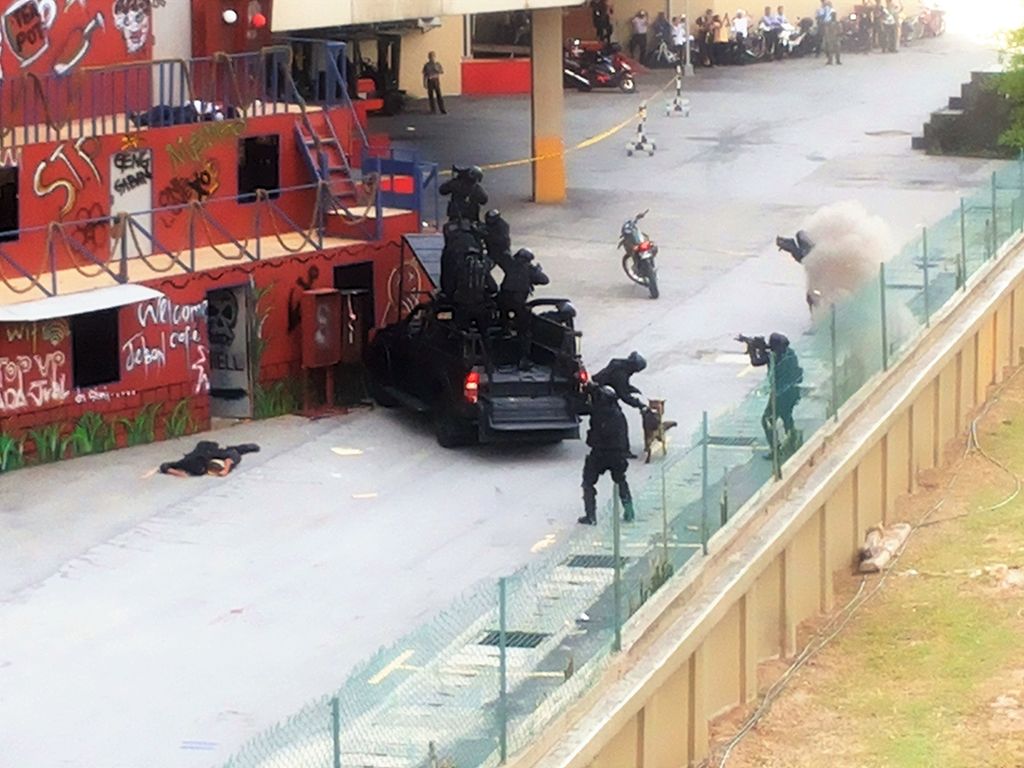
DSA 2016 – Close Quarters Battle.
“The government-imposed lockdowns have forced people to spend more time online, raising the likelihood of vulnerable individuals being exposed to radical ideologies in the cyber domain.”
On 10 January, Malaysian business news outlet malaymail.com covered a report from a Singaporean think tank, Counter Terrorist Trends and Analysis, at the S. Rajaratnam School of International Studies. According to the article, the report indicated that terrorism was decreasing in Southeast Asia due to factors associated with COVID-19.
The article noted lockdowns forced militants, like all citizens in Southeast Asia, to reduce their activities, but it also noted that the lockdowns may have produced longer-term security risks. During the lockdowns youths spent more unsupervised time online and could have been exposed to radical ideas as Islamic State in Iraq and Syria (ISIS) continued its online recruitment efforts.
In Peninsular Malaysia itself, the article noted that there were no terrorist arrests at all in 2021, which is consistent with the trend line of reduced terrorism in the region. In Sabah of Malaysian Borneo there were 15 terrorist arrests in 2021, roughly one-fifth the number of arrests there in 2019. As reported in Singapore’s Straits Times, the terrorist arrests in Sabah relate to Philippines-based Abu Sayyaf’s maritime activities, including piracy and kidnapping, that are carried out between the borders of the Philippines and Malaysia and also involve Indonesian militants. The malaymail.com article attributed the reduction in terrorism in the Philippines to the army’s capturing of militant bases in southern Mindanao.
As for Indonesia, the malaymail.com article suggested Jamaah Ansharut Daulah’s stagnation since 2020 and Mujahidin Indonesia Timor’s decline was caused by increased cost of movement, a result COVID-19 travel restrictions. The only country that saw similar numbers of violence in 2020 as 2021, according to the article, was Thailand, where an insurgency has festered for more than a decade in the country’s majority Muslim south. In general, however, the article points to the combination of COVID-19 travel restrictions and successful counter-terrorism operations to arrest militants as key factors behind the downturn in militancy in Southeast Asia.
Source:
“Terrorist threats in South-east Asia decline in 2021, according to Singapore report,” malaymail.com (Malaysian business news outlet), 10 January 2021. https://www.malaymail.com/news/malaysia/2022/01/10/terrorist-threats-in-south-east-asia-decline-in-2021-according-to-singapore/2034142
Terrorist threats in South-east Asian countries declined in 2021, a Singapore think-tank said in its annual threat assessment. There were fewer terror-related incidents in Indonesia, Malaysia, and the Philippines as governments battled Covid-19. In Thailand in 2021, meanwhile, violent incidents connected to an insurgency in the far south were similar to those in the previous year, the researchers found.
The report specifically linked the Covid-19 pandemic to the drop in terror activities in Malaysia last year. Authorities made no terror-related arrests in Peninsular Malaysia last year, but made about 15 in Sabah between May and September. The government-imposed lockdowns have forced people to spend more time online, raising the likelihood of vulnerable individuals being exposed to radical ideologies in the cyber domain. Around the region, groups such as IS have increased their recruitment and radicalisation efforts through social media during the pandemic.
Elsewhere, the armed forces of the Philippines drew praise for retaking terror bases in the southern region of Mindanao.
Source: “Malaysia’s Sabah is South-east Asian terrorists’ preferred transit point: Experts,” straitstimes.com (Singapore based news outlet), 5 September 2021. https://www.straitstimes.com/asia/se-asia/malaysias-sabah-is-south-east-asian-terrorists-preferred-transit-point-experts
As security threats posed by extremists rise in South-east Asia, Malaysia’s Sabah state has emerged as a preferred route for Indonesian militants to enter the southern Philippines to carry out their terrorist activities, according to a regional intelligence source.
Sabah appeared to be a transit point for Indonesians who want to join terror groups or learn to make IEDs (improvised explosive devices) in the Philippines, according to the source.
Source: “Annual Threat Assessment,” rsis.edu.sg (Singapore based think tank), 1 January 2021. https://www.rsis.edu.sg/wp-content/uploads/2022/01/CTTA-January-2022.pdf
Whilst this reflects a continuous declining trend of attacks and plots compared to the years preceding the COVID-19 pandemic, the 2021 terrorist landscape was particularly marked by aggressive counterterrorism (CT) operations that hauled in more than three hundred terrorist suspects – the largest figure since 2018 – including key militant group leaders.
Image Information:
Image: DSA 2016 – Close Quarters Battle.
Source: Rizuan
https://commons.wikimedia.org/wiki/File:DSA_2016_-_Close_Quarters_Battle.jpg
Attribution: CC x 2.0
